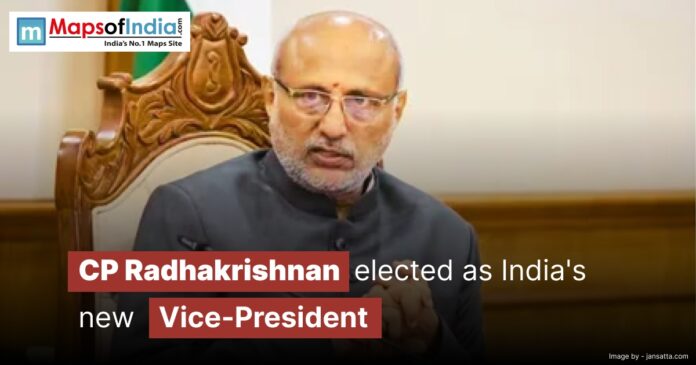The democratic process in India took another step as CP Radhakrishnan was elected as the new Vice-President of the country with 452 votes. Radhakrishnan, who came to the fore with humble roots, clean politics and over forty years in the public service, has achieved the pinnacle of constitutional offices through perseverance and hard work. It is not only a political victory but also an inspirational moment for millions of Indians who still think in the power of honesty, integrity and devotion to the country…
Early Life and Humble Beginnings
CP Radhakrishnan is a native of Tamil Nadu, where the culture of hard work and values were promoted rather than privilege. He made his own way, unlike most political leaders who enter politics with family ties. Political interest continued to be the motivation behind his entry into politics, with a strong interest in serving society and contributing to the development of the nation.
He began his career at the grassroots level, where he became active with local communities, student organizations and social activities. Gradually, the people saw him as someone who understood them well, knew their problems and could give real solutions, thus becoming a household name in Tamil Nadu. He was a type of politician who was not power-centred but people-oriented, and it did not take long before he stood out.
Rise in Political Career
Radhakrishnan made his mark as a parliamentarian when he represented Coimbatore in the Lok Sabha. His performance in Parliament was distinguished by thoughtful participation in debates, his focus on development, and his insistence on clean and transparent governance. He was never known to chase the limelight but always left an impression through substance over style.
Over the years, he held different responsibilities within the party structure, demonstrating loyalty, patience, and a results-oriented approach. His reputation as a disciplined leader earned him respect not only within his party but across political circles. He was often appreciated for his ability to engage in dialogue without being confrontational, a quality that is especially significant in parliamentary politics.
The Election as Vice-President
Every election of the Vice-President of India is always a significant event, as not only is the post the second most important constitutional post, but also it is the centre of action in the performance of the Rajya Sabha, the Upper House of Parliament. The Vice-President, in his capacity as the Chairman of the Rajya Sabha, is charged with the important responsibility of upholding decorum, making sure that there is meaningful debate and giving room to all voices in the house.
The election of Radhakrishnan was met with pride, especially in Tamil Nadu, where he had been a powerful figure. His choice also brings out the identification of those leaders who have laboured so hard without necessarily being in the limelight of the media. To the ruling establishment, his election was a guarantee of stability, experience, and the guarantee of a Vice-President who is versed in the dynamics of parliamentary actions.
Significance of His Election
The choice of CP Radhakrishnan as Vice-President carries several layers of meaning:
- Representation of South India – His promotion is adding regional balance to the upper government. The Tamils and other southern states tend to bring up the issue of greater national representation, and this election is regarded as a move towards that direction.
- A Symbol of Clean Politics – Radhakrishnan has had a reputation for being an honest politician. His transparent image builds confidence among the people in the democratic institutions at a time when most people are questioning the honesty of politics.
- Strengthening Parliamentary Democracy – As the Chairman of the Rajya Sabha, his leadership approach will play a paramount role in making the house a smoother operation. His composure and status of other ideas may be used to make the debates less confrontational and more constructive.
- Recognition of Grassroots Leaders – His experience of grassroots politics to the Vice-Presidency underscores the democratization potential of India-that anyone with commitment and service can make it to the top offices with no regard to one’s origins.
Expectations from CP Radhakrishnan
In his new position, CP Radhakrishnan will have a very diverse responsibility. As the Vice-President, we expect him to play the role of a mediator between the government and the opposition, particularly in difficult periods when the political environment is a charged one. He expects some of the following things:
- Ensuring Order in Rajya Sabha: Parliamentary sittings have always been characterized by disturbances. His role will play a critical role in the balancing of freedom of expression with the necessity to order and be productive.
- Promoting Meaningful Debates: He can encourage the Rajya Sabha to operate as a platform of policy-making and not a platform of political confrontation by promoting constructive and respectful arguments.
- Upholding Neutrality: He has a political background, but his job as a Vice-President requires impartiality. The success of his rise above party lines will be the key to his success as Chairman of the Rajya Sabha.
- Encouraging Young Parliamentarians: As a large number of first-time members join Parliament, his mentorship and advice can inspire the coming generation of leaders.
Challenges Ahead
On the one hand, his election is an occasion of rejoicing; on the other, CP Radhakrishnan will have a tough job:
- Polarized Politics: The politics of India is highly polarized nowadays. It will not be easy to ensure collaboration between conflicting parties.
- Productivity in Parliament: Over the past few years, productivity in the parliament has been declining because of the high frequency of walkouts and disruptions. It will be a challenge to his leadership to bring all parties together to lead to constructive dialogue.
- Balancing Regional and National Interests: As a representative of Tamil Nadu, he might be pressured to meet the regional interests without being national.
These issues are going to require patience, competence and diplomacy- all of which Radhakrishnan exhibited during his career.
Reactions to His Election
His election was received with congratulatory messages across the country, with various leaders across party lines nationalizing his election. His humility, approachability and lifelong service to people were hailed by many. It is even to the belief of citizens and political observers that his presence in the Rajya Sabha will bring a more mature debate and curb the unnecessary confrontation.
His rise was regarded in Tamil Nadu as a source of pride for the state. To young hopefuls in the political sphere, his rise was evidence that integrity and hard work can make one rise to the top of power.
Conclusion: A New Chapter for India
What happened when CP Radhakrishnan was elected as the Vice-President of India is not merely a political event but a word of hope and rejuvenation to Indian democracy. His life is a lesson that politics can be service-oriented, value- based and all about people.
At the dawn of his responsibility, India anticipates a Vice-President who is not only going to uphold the dignity of his office but also empower parliamentary democracy as well. His relaxed, but decisive, approach to leadership could be just what the Rajya Sabha could use in the coming years.
To the citizens, his election is a time of pride, and it is an assurance that honesty in politics is not yet dead. To the political elite, it is a lesson that devotion and sincerity may lead them to the honours. And to India it is but the commencement of a new phase of her democratic career–a phase in which the leadership of CP Radhakrishnan is pledged to be a period of moderation, of honour and of advance.





